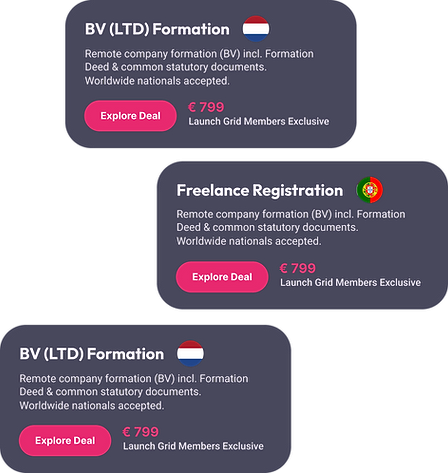We offer pre-made company registrations in the Netherlands, providing a fast and efficient solution for businesses looking to operate immediately. With a shelf company, you can bypass the lengthy incorporation process and start trading without delay.
Use our Entity Management site to purchase your pre-made company in the Netherlands. Our platform offers a seamless experience to acquire a fully registered business, providing you with control and flexibility. You can browse available companies, complete the purchase online, and begin operations right away.


Shelf companies provide a ready-to-use business structure, while new legal entity formation involves creating a company from scratch. Below are seven key points comparing both options.
Time to Operate
Reputation and History
Compliance and Documentation
Costs and Expenses
Business Flexibility
Risk and Legal Exposure
Branding and Identity
Choosing between a shelf company and new legal entity formation depends on your business needs, urgency, and risk tolerance. Each option has its advantages, from immediate operations with a shelf company to complete customization with a new entity.
Transferring a Dutch shelf company is a quick and efficient process. With pre-registered companies ready for acquisition, the transfer involves minimal paperwork and legal hurdles. Our team ensures a seamless transition, handling all necessary documentation, including updating the company’s registration with the Dutch Chamber of Commerce.
This allows you to take control of an established entity within days, ensuring you can start business operations immediately. Shelf companies come with clean histories and no prior liabilities, providing a risk-free foundation for your business. Our experts streamline the transfer process, saving you time and enabling a smooth ownership transition.
Shelf companies provide an efficient alternative to forming a new legal entity. These pre-registered companies are ready for immediate use, allowing businesses to bypass the lengthy incorporation process. By purchasing a shelf company, you gain access to an established business structure, including compliance documentation and, in some cases, a business history.
This option is ideal for entrepreneurs who need to start operations quickly or those looking to benefit from an existing company's reputation. Shelf companies save time, reduce legal complexities, and provide a hassle-free route to business ownership.
"I was impressed with how fast and easy it was to acquire a shelf company. The process was seamless, and I was able to start operating my business immediately!"
 John M.
John M."Their professional support made the entire transfer process smooth. I now own a ready-to-use company with no hassle at all. Highly recommend!"
 Sarah L.
Sarah L."The shelf company I purchased came with a solid reputation, which helped boost my business credibility right away. Excellent service and communication throughout the process!"
 David K.
David K.Interested in acquiring a Dutch firm that’s already up and running? Our pre-made Dutch companies provide you with a fast-track solution to enter the market without the hassle of forming a new entity. With a shelf company, you gain an established business structure, complete with a tax-efficient setup and a corporate history, allowing you to start operations immediately.
Our team ensures a seamless ownership transfer, offering expert guidance through every legal and administrative step. Get your business started in the Netherlands quickly and efficiently with our ready-to-go company options. Contact us today to learn more!








When launching a business abroad, many entrepreneurs may not be fully aware of the advantages it can bring. Expanding into international markets opens up new opportunities for growth, access to diverse customer bases, and the potential for increased revenue. By understanding these benefits, business owners can make informed decisions about their global expansion strategies.
One crucial aspect of launching a business overseas is navigating the legal and regulatory frameworks of the target country. Each nation has its own set of rules governing business operations, from company registration to taxation. Familiarizing oneself with these regulations is essential to ensure compliance and avoid potential legal pitfalls. Engaging local legal experts can streamline this process, making it easier to establish a foothold in the new market.
Another key factor in successfully launching a business abroad is the importance of building a global network. Establishing connections with local suppliers, partners, and customers can provide valuable insights into market trends and consumer behavior. Networking can also lead to collaboration opportunities and access to resources that may not be available in the entrepreneur's home country.
Before incorporating a business entity, it’s essential to determine the appropriate structure that aligns with your goals. Common structures include sole proprietorships, partnerships, limited liability companies (LLCs), and corporations. Each type has different legal implications, liability protections, and tax obligations. Researching these options will help you make an informed decision that suits your business needs.
The incorporation process involves several key steps, beginning with selecting a unique business name that complies with local regulations. Next, you’ll need to file the necessary documents, such as articles of incorporation, with the relevant governmental authority. Depending on your jurisdiction, you may also need to pay a registration fee. It's crucial to ensure that your business name is not already in use and adheres to state naming requirements.
Once incorporated, your business must comply with ongoing legal requirements, such as obtaining the necessary licenses and permits to operate legally. This may include business licenses, zoning permits, and industry-specific regulations. Additionally, regular filings, such as annual reports or tax returns, are essential to maintain good standing. Understanding these compliance obligations ensures your business operates legally and avoids potential penalties.
Professional services specialize in handling all aspects of documentation required for company registration. This includes preparing and reviewing essential documents such as the articles of incorporation, shareholder agreements, and identification verification. By utilizing their expertise, businesses can avoid common pitfalls and ensure that all paperwork is accurately completed and compliant with local laws. This streamlined management minimizes the risk of delays and rejections, allowing for a smoother registration process.
Navigating the legal requirements for company registration can be complex and time-consuming. Professional services offer invaluable guidance, helping clients understand the specific regulations in their jurisdiction. They stay updated on any changes in law, ensuring that the registration process meets all necessary criteria. Their experience allows businesses to confidently navigate the regulatory landscape, reducing the likelihood of errors that could lead to costly fines or legal complications.
Once all documentation is prepared, professional services can efficiently submit the registration application on behalf of the client. Their established relationships with local authorities can expedite the process, resulting in quicker approval times. By managing all interactions with government agencies, they free up valuable time for business owners, allowing them to focus on other crucial aspects of their operations while ensuring compliance and efficiency in the registration process.
Launching an international enterprise is an exciting yet challenging endeavor. Entrepreneurs must navigate various complexities, including understanding local markets, cultural differences, and regulatory environments. Each country presents unique opportunities and challenges, making thorough research and market analysis essential. A clear understanding of the landscape is crucial for identifying potential risks and rewards.
Establishing a robust business model is vital for international success. This involves not only defining your product or service offerings but also understanding pricing strategies and distribution channels. Building a strong foundation requires assembling a reliable team with expertise in international business, marketing, and legal compliance. This diverse team will help you navigate the complexities of different markets while ensuring alignment with your business goals.
Once your enterprise is up and running, the journey doesn't end. International markets are dynamic, requiring businesses to remain flexible and adaptable. Regularly monitoring market trends, customer feedback, and competitors will help you refine your strategies and maintain relevance. Embracing a mindset of continuous improvement will empower your enterprise to thrive in an ever-changing global landscape.
Hiring professionals for assistance can significantly enhance the success of your business. Experts such as accountants, lawyers, and marketing specialists bring valuable knowledge and experience to the table. They can help you navigate complex legal regulations, manage finances efficiently, and develop effective marketing strategies.
Additionally, leveraging the skills of consultants can provide fresh insights and innovative solutions to challenges you may face. By investing in professional assistance, you can focus on core business activities while ensuring compliance and optimal performance, ultimately leading to sustainable growth and success in your venture.
A shelf company is a pre-registered, legally established business entity that has no prior operations or liabilities. It’s “on the shelf” ready for immediate use, allowing buyers to skip the time-consuming incorporation process.
Purchasing a shelf company provides instant access to an established business entity, saving time and allowing for immediate operations. It can also offer credibility due to its established history, which may benefit financing and partnerships.
A shelf company specialist assists with the acquisition, transfer of ownership, legal compliance, and administrative setup of pre-registered companies. They ensure a smooth process from purchase to operational readiness.
Yes, you can change the name, business activities, and other details after purchasing a shelf company, with assistance from legal experts to ensure compliance with local regulations.
Stay updated with the latest news and exclusive offers. Subscribe to our newsletter for regular insights delivered to your inbox!